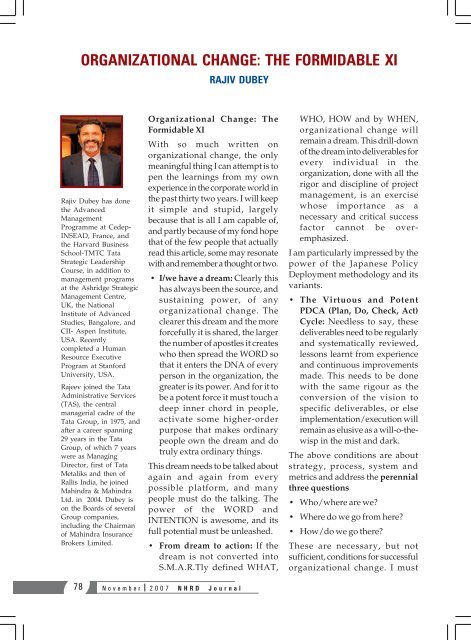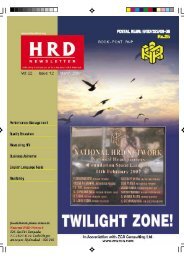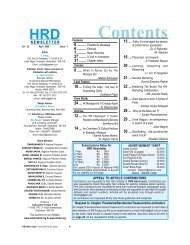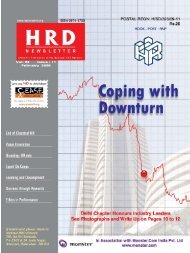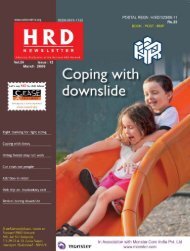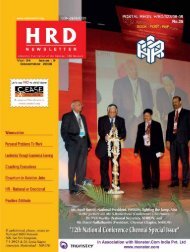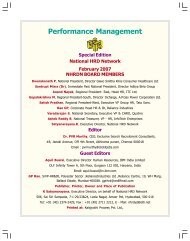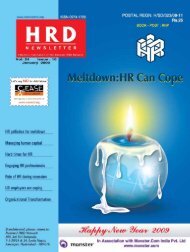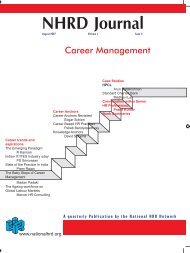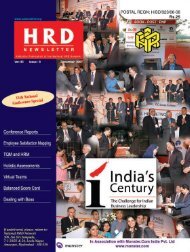NHRD Journal - National HRD Network
NHRD Journal - National HRD Network
NHRD Journal - National HRD Network
Create successful ePaper yourself
Turn your PDF publications into a flip-book with our unique Google optimized e-Paper software.
ORGANIZATIONAL CHANGE: THE FORMIDABLE XI<br />
RAJIV DUBEY<br />
Rajiv Dubey has done<br />
the Advanced<br />
Management<br />
Programme at Cedep-<br />
INSEAD, France, and<br />
the Harvard Business<br />
School-TMTC Tata<br />
Strategic Leadership<br />
Course, in addition to<br />
management programs<br />
at the Ashridge Strategic<br />
Management Centre,<br />
UK, the <strong>National</strong><br />
Institute of Advanced<br />
Studies, Bangalore, and<br />
CII- Aspen Institute,<br />
USA. Recently<br />
completed a Human<br />
Resource Executive<br />
Program at Stanford<br />
University, USA.<br />
Rajeev joined the Tata<br />
Administrative Services<br />
(TAS), the central<br />
managerial cadre of the<br />
Tata Group, in 1975, and<br />
after a career spanning<br />
29 years in the Tata<br />
Group, of which 7 years<br />
were as Managing<br />
Director, first of Tata<br />
Metaliks and then of<br />
Rallis India, he joined<br />
Mahindra & Mahindra<br />
Ltd. in 2004. Dubey is<br />
on the Boards of several<br />
Group companies,<br />
including the Chairman<br />
of Mahindra Insurance<br />
Brokers Limited.<br />
Organizational Change: The<br />
Formidable XI<br />
With so much written on<br />
organizational change, the only<br />
meaningful thing I can attempt is to<br />
pen the learnings from my own<br />
experience in the corporate world in<br />
the past thirty two years. I will keep<br />
it simple and stupid, largely<br />
because that is all I am capable of,<br />
and partly because of my fond hope<br />
that of the few people that actually<br />
read this article, some may resonate<br />
with and remember a thought or two.<br />
• I/we have a dream: Clearly this<br />
has always been the source, and<br />
sustaining power, of any<br />
organizational change. The<br />
clearer this dream and the more<br />
forcefully it is shared, the larger<br />
the number of apostles it creates<br />
who then spread the WORD so<br />
that it enters the DNA of every<br />
person in the organization, the<br />
greater is its power. And for it to<br />
be a potent force it must touch a<br />
deep inner chord in people,<br />
activate some higher-order<br />
purpose that makes ordinary<br />
people own the dream and do<br />
truly extra ordinary things.<br />
This dream needs to be talked about<br />
again and again from every<br />
possible platform, and many<br />
people must do the talking. The<br />
power of the WORD and<br />
INTENTION is awesome, and its<br />
full potential must be unleashed.<br />
• From dream to action: If the<br />
dream is not converted into<br />
S.M.A.R.Tly defined WHAT,<br />
WHO, HOW and by WHEN,<br />
organizational change will<br />
remain a dream. This drill-down<br />
of the dream into deliverables for<br />
every individual in the<br />
organization, done with all the<br />
rigor and discipline of project<br />
management, is an exercise<br />
whose importance as a<br />
necessary and critical success<br />
factor cannot be overemphasized.<br />
I am particularly impressed by the<br />
power of the Japanese Policy<br />
Deployment methodology and its<br />
variants.<br />
• The Virtuous and Potent<br />
PDCA (Plan, Do, Check, Act)<br />
Cycle: Needless to say, these<br />
deliverables need to be regularly<br />
and systematically reviewed,<br />
lessons learnt from experience<br />
and continuous improvements<br />
made. This needs to be done<br />
with the same rigour as the<br />
conversion of the vision to<br />
specific deliverables, or else<br />
implementation/execution will<br />
remain as elusive as a will-o-thewisp<br />
in the mist and dark.<br />
The above conditions are about<br />
strategy, process, system and<br />
metrics and address the perennial<br />
three questions<br />
• Who/where are we?<br />
• Where do we go from here?<br />
• How/do we go there?<br />
These are necessary, but not<br />
sufficient, conditions for successful<br />
organizational change. I must<br />
78<br />
November 2007 <strong>N<strong>HRD</strong></strong> <strong>Journal</strong>


